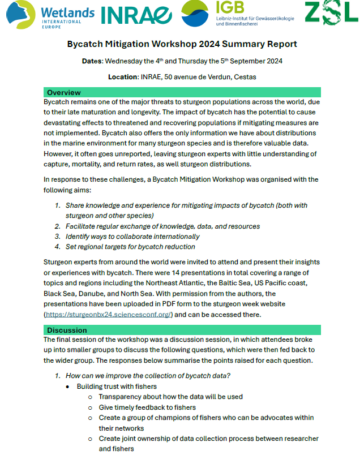
Throwback on the “Sturgeon bycatch mitigation workshop”
-
Biodiversity - Swimways
On 4-5 September 2024, our member the Zoological Society of London (ZSL) brought together scientists, public authorities, NGOs, anglers, and other sturgeon enthusiasts near Bordeaux (France), at the INRAE research center. This workshop aimed at discussing bycatch, one of the biggest issues causing sturgeon mortality, and reflecting on solutions to mitigate the impact on one of the most critically endangered group of species in Europe.
In Europe, bycatch remains one of the leading causes of sturgeon mortality, pushing these prehistoric species, who outlived dinosaurs and survived multiple ice ages, even closer to extinction. All eight sturgeon species native to Europe are highly threatened by bycatch: Freshwater species (Adriatic, Sterlet and Ship) are endangered in river systems during their reproductive periods and early life cycle phases, while the five remaining diadromous species (European, Russian, Stellate, Atlantic and Beluga) are at risk of bycatch in different coastal fisheries due to their utilization of shallow marine habitats as feeding grounds.
Sturgeon bycatch data often goes unreported and remains sparse, while it is essential to inform conservation efforts. The ZSL workshop addressed this gap by exploring strategies to both improve data collection and reduce bycatch rates.
Establishing collaborative mitigation strategies
The workshop featured presentations covering a wide range of European regions, including the Northeast Atlantic, the Baltic Sea, the Black Sea, and the Danube, providing insights into the current state of sturgeon populations and bycatch mitigation strategies while emphasizing the need for cross-border collaboration. Discussions among participants were facilitated through thematic group discussions on improving bycatch data collection, forming partnerships, and harmonizing protection measures for different species.
A key theme throughout the workshop was the importance of building trust between fishers and researchers to ensure accurate and consistent data collection. The need for transparent communication and shared ownership of data collection processes was explored, as well as the potential for financial and non-financial incentives – media recognition or even lottery-based systems for instance – to encourage fishers reporting sturgeon bycatch. Ideas for technical solutions, such as mobile apps to streamline reporting and provide real-time feedback to fishers were also discussed. Methods to adapt gear and fisheries opening, along with guidelines on how to handle bycaught sturgeons were also discussed, in order to limit the impact of bycatch on species and increase chances of survival for bycaught sturgeons.
Collaborative efforts are essential to develop effective bycatch mitigation strategies, to protect these iconic species for future generations. To learn more about the presentations and resources shared during the workshop, please refer to the workshop summary authored by Hannah McCormick (ZSL) below and visit the event’s dedicated webpage here.

